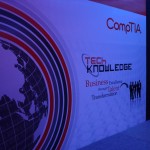 Gadgets are the new cool – everyone wants the latest mobile phone, iPad 2, Motorola Xoom, Samsung Galaxy and a myriad of others. In fact, at the recent CRN PartnerConnect conference at the Ricoh Arena, where we talked about cloud business opportunities and mobility, our CEO Todd Thibodeaux brought all of these devices with him in his hand luggage and showed them to the audience, which generated a combination of laughter and interest. Todd also talked about making IT cool (http://blog.comptia.org/2011/05/09/making-it-cool/) and I would like to pick up on this.
Gadgets are the new cool – everyone wants the latest mobile phone, iPad 2, Motorola Xoom, Samsung Galaxy and a myriad of others. In fact, at the recent CRN PartnerConnect conference at the Ricoh Arena, where we talked about cloud business opportunities and mobility, our CEO Todd Thibodeaux brought all of these devices with him in his hand luggage and showed them to the audience, which generated a combination of laughter and interest. Todd also talked about making IT cool (http://blog.comptia.org/2011/05/09/making-it-cool/) and I would like to pick up on this.
When I present to audiences about some of the trends in technology, eyebrows are always raised when I ask about engaging our young employees and utilizing social media for business. Why? The younger generation are digital natives and they live and breath the technology that so fascinates my generation. For them, it is their oxygen, a gateway to the outside world. They also understand how it works, how it connects, and how to maximize it, so why do we push back and in some cases not allow social media sites in the office during work time. My view is that we should encourage its use, and also invite the younger generation to tell us how we can build sites to target the new generation on the platforms they are so comfortable with. That is how we can tie “cool” and “IT” together, and create a new harmony in the workplace. More importantly, by doing this we make our companies a more exciting place to work and we will attract the new generation to want to work for us. Today they have a choice, and those with the skills and talent will decide whether they want to add us to their CV. They are vitally important to our success, regardless of how cool we think our company is – we must engage them on their terms, because they are both our workforce and our customer of tomorrow.
Above was the view at the Ricoh Arena from my room when I drew the curtains in the morning. What a great idea to combine corporate hospitality suites with hotel bedrooms to maximize use of the space. Another cool.

 I love David and Goliath stories and so I was immersed in a story about independent bookshops that are bucking the trend and doing well against the giants of the e-tailing world. How? By putting to effective use their secret weapon: PEOPLE. Individuals with the specialist knowledge, people skills and personal touch to make customers want to go in and buy books, even though they are almost always cheaper online. Brilliant and encouraging for every small business.
I love David and Goliath stories and so I was immersed in a story about independent bookshops that are bucking the trend and doing well against the giants of the e-tailing world. How? By putting to effective use their secret weapon: PEOPLE. Individuals with the specialist knowledge, people skills and personal touch to make customers want to go in and buy books, even though they are almost always cheaper online. Brilliant and encouraging for every small business.

 I wonder how long it will take before email is passé. Our youngsters today are less inclined to send email because it is too long a process, and instant messaging is fast and with-it! I hear some unversities have stopped distributing email accounts to their students, and instead are giving out eReaders, iPads and Tablet computers – that’s the kind of place I would like to study.
I wonder how long it will take before email is passé. Our youngsters today are less inclined to send email because it is too long a process, and instant messaging is fast and with-it! I hear some unversities have stopped distributing email accounts to their students, and instead are giving out eReaders, iPads and Tablet computers – that’s the kind of place I would like to study.



